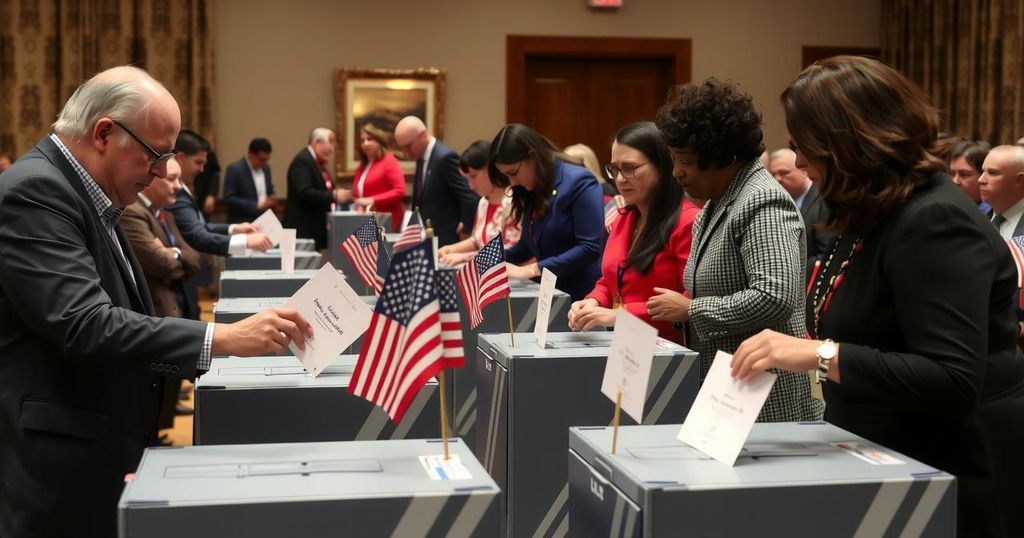Colorado’s electoral votes have been cast for Kamala Harris, with Governor Jared Polis highlighting the significance of the electors’ roles. Despite winning the state, Harris lost overall to Donald Trump. The article discusses the National Popular Vote Interstate Compact and its implications for future presidential elections.
Colorado has officially cast its electoral votes, totaling ten, in favor of Kamala Harris during the presidential election. The electors, chosen by the Colorado Democratic Party, unanimously supported not only Harris but also her running mate, Tim Walz. Although the Democratic ticket won 54% of the popular vote in Colorado, they ultimately lost to the candidate Donald Trump and his vice presidential partner, JD Vance. On the national scale, Harris obtained 226 electoral votes, whereas Trump garnered 312.
The voting process was overseen by Colorado Governor Jared Polis and Secretary of State Jena Griswold, with the participation of Colorado Supreme Court Justice Brian Boatwright. In an address to the electors, Governor Polis highlighted the significance of their role, quoting the late civil rights leader John Lewis: “Your vote is precious. It is the most powerful nonviolent tool we have to create a more perfect union.” He further remarked on the uniqueness of their position as representatives of the entire state’s electorate, stating, “You are my voice. You are all of our voices. You are the 10 people that actually get to vote on behalf of the entire state of Colorado for the next president of the United States. That is special. That is very exciting, and it is something that you will treasure as a memory.”
Additionally, Governor Polis discussed the National Popular Vote Interstate Compact, which Colorado joined in 2019. This compact aims to abolish the Electoral College, declaring that the candidate receiving the most popular votes should be the election winner. Currently, 17 states along with Washington, D.C. have joined the compact, yet it requires an extra 61 electoral votes to become effective. Polis expressed hope for the compact’s prompt activation while noting the challenges associated with pursuing a constitutional amendment to dissolve the Electoral College, stating, “The interstate compact requires potentially just two more states or one really big state, but a constitutional amendment requires two-thirds of Congress and then three-quarters of the states.”
It is important to note that under the National Popular Vote Interstate Compact, Colorado’s electoral votes would have been allocated to Trump. Each elector was required to take an oath to vote for the candidate with the highest number of votes in the state, which seeks to uphold the democratic principle of popular will. After the swearing-in ceremony, the electors cast their official votes for Kamala Harris, and these votes were subsequently certified by Secretary Griswold.
Moreover, Governor Polis issued a proclamation affirming the approval of ten ballot measures by voters during the November election, further emphasizing the democratic engagement of Colorado’s constituency.
The process of the Electoral College plays a crucial role in the United States presidential elections, where electors represent each state’s voters. Colorado, having a predominantly Democratic voting record in recent years, participated in this democratic framework by casting its electoral votes for Kamala Harris after she and her running mate received the majority of the state’s votes. The article also addresses contemporary discussions surrounding electoral reforms, including the National Popular Vote Interstate Compact, which seeks to alter the traditional electoral process in favor of direct popular vote for presidential contests.
In summary, Colorado’s electors’ formal casting of votes for Kamala Harris reflects the state’s democratic choice, albeit within a broader electoral context where the result favored Donald Trump nationally. The Governor’s remarks underscore the importance of each elector’s role in representing the voice of the populace, while the discourse on electoral reform through the National Popular Vote Interstate Compact indicates an ongoing evolution in the American voting system. By affirming the constitutional obligations of electors and advocating for potential reforms, Colorado continues to engage in meaningful democratic practices.
Original Source: www.coloradopolitics.com






